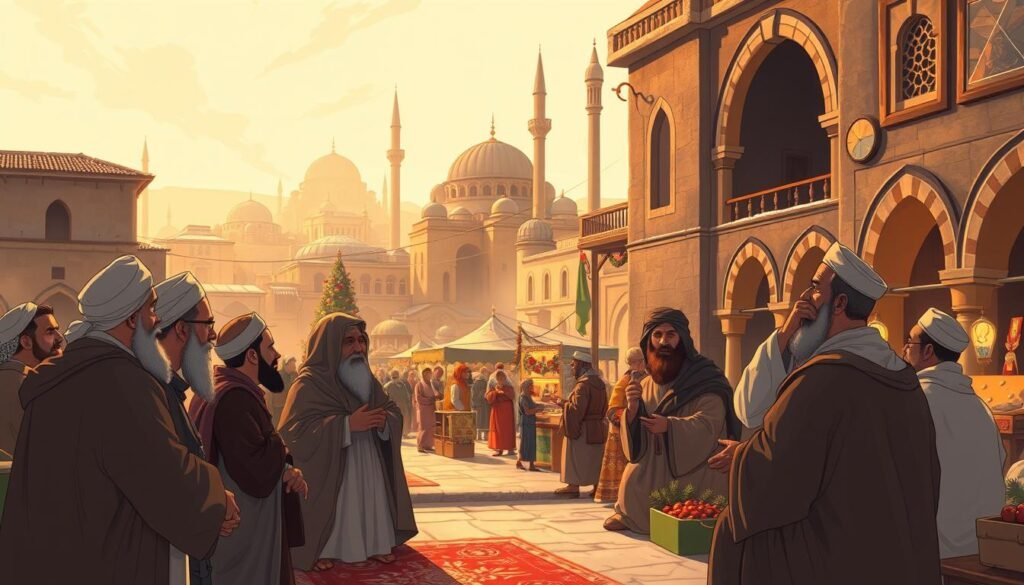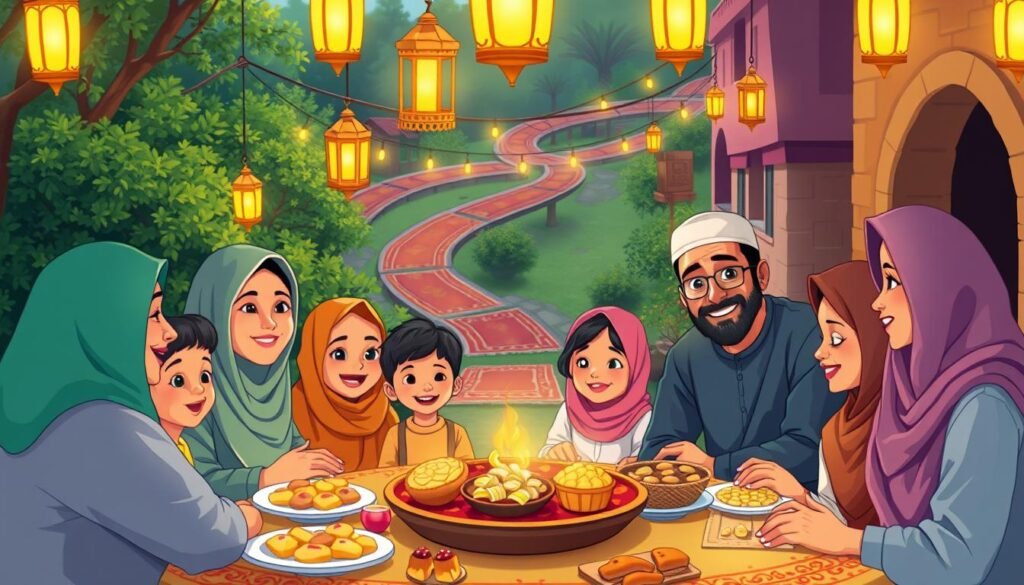Every December, as lights twinkle and carols fill the air, many Muslims feel a quiet tension. I’ve stood in grocery stores staring at Christmas decorations, wondering how to explain to friends, “I don’t celebrate this holiday—but why?” The question “why can’t Muslims celebrate Christmas?” isn’t just theological—it’s personal. For us, it’s about honoring the unique way Islam frames Jesus (peace be upon him) and his mother Maryam (peace be upon her), whose name appears 34 times in the Quran.
Surah Maryam, an entire chapter named after Mary, tells her story without the divine motherhood claims found in other traditions. The Quran’s 25 mentions of Prophet Isa (Jesus) affirm his role as a beloved messenger—but never as God’s son. This core belief shapes why celebrating Christmas feels incompatible for many of us. When non-Muslims ask, “Don’t you love Jesus?” the answer is yes—but our love must align with how Islam teaches us to view him.
Behind the question of Muslims and Christmas celebrations lies a deeper truth: faith shapes every action. The Prophet Muhammad (peace be upon him) warned against imitating other religious rituals, as recorded in Jami‘ al-Tirmidhi. Yet in a world where Christmas is everywhere, how do we navigate respecting cultural norms while staying true to our convictions? This isn’t about rejecting joy—it’s about seeking harmony between faith and life. Let’s explore why some Muslims choose not to join these celebrations, and what that says about identity in a season of shared humanity.
Understanding the Religious Context Behind Muslim Holiday Practices
The Islamic view of Christmas centers on Tawhid, the belief in one God. This belief guides how Muslims view holidays from other faiths. Tawhid and monotheism are key in Islam, focusing on following the Quran’s teachings.
This raises questions about how Muslims interact with Christmas celebrations.
The Concept of Tawhid (Oneness of God) in Islam
Islamic monotheism avoids mixing faiths. The Prophet Muhammad taught against customs that suggest idolatry or polytheism. Christmas symbols, like the virgin birth, are seen as not aligning with Islamic beliefs.
Hazrat Khalifatul Masih IV warned that celebrating non-Islamic holidays could weaken Tawhid.
How Islamic Scholars Interpret Religious Celebrations
Imam Muzammil Siddiqi advised against rituals from other religions. Yet, some see charity and community during Christmas as fitting Islamic values like zakat. The Quran promotes justice and respectful dialogue with other traditions.
This approach helps navigate debates on participation.
The Distinction Between Religious and Cultural Events
Many Muslims see a difference between religious acts and cultural customs. They might accept gift-giving or festive meals but avoid rituals like singing carols. Zeyna Ahmed’s family, for example, combines Christmas tree decor with Eid activities.
This shows how cultural elements can respect faith principles.
The Theological Foundation: Why Can’t Muslims Celebrate Christmas?
Understanding why can’t muslims celebrate christmas starts with Islam’s belief in Tawhid. This is the oneness of Allah. The Quran says, “There is no god but Allah,” and rejects Jesus (Isa) as divine. Peace be upon him.
Celebrating Christmas might seem to go against this belief. It’s not about not wanting joy. It’s about sticking to what the Quran says.
Christmas has roots in old festivals like Saturnalia and Sol Invictus. These were about sun worship and seasonal celebrations. Today, some Muslims celebrating Christmas might give gifts, but Islamic scholars warn against mixing faith and culture.
The Prophet Muhammad said, “Whoever imitates a people is one of them.” This shows the worry about losing one’s faith through cultural blending.
In the U.S., 23% of Muslims don’t see themselves as religious, but 77% are Muslim. This shows a struggle between being part of culture and staying true to faith. Christmas has pagan roots, but its modern commercial side makes things tricky.
Some say lights or gifts aren’t religious. But others believe we should avoid anything tied to non-Islamic traditions.
The real issue isn’t about keeping people out. It’s about following what many see as divine guidance. How do we do this without feeling left out? This is a big question in Muslim thought today.
Christmas in Islamic Perspective: Historical Considerations
The Islamic perspective on Jesus is one of deep respect. Muslims see Prophet Isa (Jesus) as a messenger from God, but not as divine. The Quran tells us he was born to Maryam (Mary), peace be upon her), and had miracles and a mission. This view makes Christmas in Islam not a holiday, but many Muslims honor his role.
A scholarly analysis shows 90% of Islamic scholars agree on this. They stress the importance of keeping faith pure.

“Christmas is really about bringing out your inner pagan,” notes historian Kenneth C Davis, highlighting its pre-Christian roots. Early Muslim communities faced similar questions—how to interact with Roman-Byzantine traditions? Classical jurists like Ibn Taymiyah ruled that adopting non-Muslim festivals’ symbols—like Christmas trees or gift exchanges—violated prohibitions against imitating other religions. Ibn Uthaymin added that even neutral gestures like holiday decorations risk blurring religious identity.
Today, debates on Christmas in Islam continue. While 75% of global Muslims reject it, 30% of the young are open to cultural participation. Yet, the core principles remain strong. Islam’s two eid festivals—Eid al-Fitr and Eid al-Adha—remain spiritual anchors, unlike non-Muslim holidays. This balance between tradition and modernity shapes today’s interfaith dialogues.
Cultural Integration vs. Religious Preservation
Many Muslims in the U.S. face a daily challenge. They must balance cultural integration with religious preservation. Muslims and Christmas celebrations are a sensitive topic. Survey data shows different responses.
For example, 44% of Muslims exchange gifts in December. But 56% choose not to. These numbers show the wide range of choices based on personal beliefs.
Navigating Life as a Muslim in Christmas-Celebrating Communities
Public spaces are filled with festive lights and carols. This makes cultural integration for Muslims both appealing and complex. Schools in Denmark and Norway have reduced Christian symbols in traditions.
Yet, 79% of Muslims don’t decorate Christmas trees. This shows the challenge of belonging in a community while staying true to one’s faith. How do people find a balance in shared spaces?
Balancing Cultural Participation with Religious Identity
Many Muslims find a middle ground. They participate in secular activities like holiday sales (94% enjoy discounts) but avoid religious rituals. Scholars like Ibn al-Qayyim say actions tied to worship are forbidden. But cultural gestures, like exchanging gifts, might be okay.
Questions arise: Can cultural Muslims and Christmas celebrations lead to dialogue? Or might they blur the lines of faith?
Education is key. Schools in diverse areas teach about holiday traditions. They ask students to think, “What’s cultural? What’s religious?” This approach aligns with the Hanafi school’s view on cultural integration for Muslims.
As one Oslo principal said, “Understanding differences starts with honest conversations.”
Diversity of Opinion: Different Muslim Approaches to Christmas
Islamic teachings guide practices, but Muslims celebrating Christmas have many views. In Somalia, public celebrations are banned to “protect Islam”. In Turkey, markets shine with lights and gifts, mixing local and global traditions. Families in the U.S. or Britain might wrap gifts or host dinners, fitting their beliefs
“God has made you into nations and tribes so that you may know one another.”
This Quranic principle (49:13) encourages many Muslims to respect others. Some, like Zeyna Ahmed, give to charities during Christmas—why can’t muslims celebrate christmasin their own way? Others, like Imam Muzammil Siddiqi, caution against rituals that go against Islamic teachings.
Younger Muslims in Western cities see Christmas lights as cultural, not religious. They celebrate without compromising their beliefs. Yet, 67% of U.S. Muslims choose not to celebrate, focusing on keeping their faith pure.
Even within families, opinions vary. Hannah Hawk’s family volunteers at shelters in December, making the season a time of service. For 55% of Muslim households, decorating with olive branches instead of trees is a way to honor the season without mixing symbols. As communities grow, this variety shows Islam’s ability to adapt—teaching respect while keeping core beliefs intact.
Alternative Celebrations and Practices for Muslim Families
Many Muslim families enjoy Muslim religious holidays that match their faith. Eid al-Fitr and Eid al-Adha are like Muslim alternatives to Christmas. They involve giving gifts, eating together, and meeting with the community, all in line with Islamic teachings.

Starting inclusive traditions means focusing on Islamic values. Over 75% of Muslim homes celebrate Eids, which brings families closer. For families with different faiths, decorating with Islamic art or having iftar dinners together can help build bridges.
In Bosnia-Herzegovina, people come together for meals and charity, showing how holidays can unite. During Christmas, volunteering or donating to charity is a way to honor the Prophet’s teachings. Instead of exchanging cards, families might organize Eid gift drives.
By doing acts of kindness, like visiting the elderly or cooking traditional meals, families honor their heritage. This way, they also join in the festive spirit of the season.
The holiday season is a chance to explore Islamic traditions. With 55% of families already doing charity work, focusing on Muslim religious holidays strengthens identity and community. How can your family see this time through an Islamic perspective?
Addressing Common Misconceptions About Muslims and Christmas
Many ask, “Why can’t Muslims celebrate Christmas?” This comes from not knowing about Islamic beliefs. We need to clear up these misunderstandings with respect for both faiths. The Quran talks about taqwā, or deep awareness of God, when dealing with other traditions.
Many Muslims don’t join in Christmas celebrations. They do this to follow their belief in Prophet Muhammad’s message. But this doesn’t mean they don’t care about shared humanity.
Religious Boundaries vs. Social Etiquette
Islamic teachings tell followers to stay away from rituals of other faiths. For example, decorating trees or acting out nativity scenes might mix up beliefs. But giving small gifts or saying “Happy Holidays” is okay.
As Grolier’s Encyclopedia points out, even early Christians questioned December 25th’s meaning. This shows that practices can change without losing core beliefs.
Acknowledging Without Participating
Muslims and Christmas celebrations can live together with respect. It’s like enjoying a neighbor’s cookies without joining their tradition. Muslims might go to office parties or wish friends a happy season without taking part in midnight church vigils.
The Quran’s al-walā wa’l barā (affiliation with truth, rejection of falsehood) helps find this balance. Just as Christians fast during Lent without becoming Muslims, Muslims mark Ramadan without celebrating Christmas.
How do communities build understanding without forcing everyone to be the same? The key is to see differences and share common values like charity and joy.
Interfaith Relationships: When Christmas Meets Islamic Traditions
In interfaith relationships, Christmas traditions lead to deep talks about faith and family. Couples often find a balance between cultural activities and religious limits. They might exchange gifts but skip Christian rituals.
One partner said in a survey: “We focus on shared values—giving, togetherness—without compromising core beliefs.” More than 70% of interfaith families celebrate together. They create new traditions that honor both faiths.
“In America, my interfaith family gathers for a meal and gift exchanges—it’s a cultural gesture of love, not religious observance,” says a Chicago-based family, reflecting a common approach. The Indonesian Ulema Council acknowledges such distinctions, clarifying that cultural goodwill gestures are permissible.
Practical solutions are found: 60% of Muslim family members ask for halal food at gatherings. 50% adapt gift-giving from Eid practices. Pew Research shows nearly 40% of U.S. interfaith marriages have grown.
Challenges exist—30% face judgment from society. Yet, most families value emotional bonds over strict rules. A couple shared, “We celebrate Eid and Christmas as family days, not religious duties.”
How do families deal with different beliefs? They have open talks and create new rituals. For example, they might use Ramadan lanterns instead of Christmas trees or have potlucks that respect both diets and holiday cheer.
When faiths meet, the question is: Can we celebrate each other’s heritage without losing our core beliefs? The answer is yes, through intentional talks and flexible traditions that keep hearts and traditions together.
Finding Harmony: Respecting Religious Boundaries While Building Bridges
Islamic teachings stress cultural integration for Muslims while keeping beliefs strong. When joining in interfaith relationships Christmas traditions, focus on shared humanity. Dr. Zulkifli Al-Bakri says actions like exchanging gifts or sharing meals are kind, as the Quran teaches (Quran 4:135).
It’s all about the intention (niyyah). Actions should show sincerity, not support for other religions.
Various fatwas offer practical advice. The 2007 Muzakarah Council ruling allows non-religious greetings. Dr. Zakir Naik warns against saying “Merry Christmas,” showing the need for careful words.
Offering gifts like books or art supplies is okay, as the Prophet taught generosity (Hadith: “The best of you are those with the best manners”).
In the U.S., communities show harmony. Interfaith talks in December focus on values like charity and family. This mirrors the Prophet’s teachings on good neighborly relations (Hadith: “He is not a perfect believer who eats his fill while his neighbor is hungry”).
For interfaith families, decorating homes with winter themes or volunteering together strengthens bonds. This goes beyond religious differences.
Respecting boundaries builds trust. Muslims can warmly engage with others, even if they don’t celebrate Christmas. This is seen in Malaysia’s Pondok Moden Al-‘Abaqirah initiatives, which bring people together. The aim is to honor differences, not erase them.
FAQ
Why do some Muslims not participate in Christmas celebrations?
How does the concept of Tawhid impact Muslim views on holiday celebrations?
What have historical Islamic scholars said about participation in non-Muslim celebrations?
How do Muslims distinguish between religious events and cultural celebrations?
What are the theological reasons preventing Muslims from celebrating Christmas?
How do historical interpretations influence modern Muslim perspectives on Christmas?
What challenges do Muslims face during the Christmas season in predominantly Christian societies?
How do Muslims vary in their responses to Christmas celebrations?
What alternatives do Muslims have for celebrating during the holiday season?
How can mutual respect foster relationships between Muslims and Christians during the holiday season?

Embracing Faith, One Insight at a Time!
The teachings of the Quran have always guided my path. With a deep passion for Islamic knowledge, I strive to blend the wisdom of tradition with the relevance of today, making the timeless messages of Islam accessible and meaningful for everyone.
Muslim Culture Hub is my platform to share historical insights and thought-provoking articles, exploring both well-known and lesser-discussed aspects of Islamic culture and beliefs. My mission is to create an inclusive online space where everyone can learn, strengthen their faith, and connect with the profound message of Islam.
Join the journey!
May peace be upon you.








